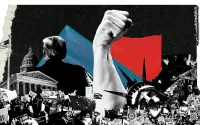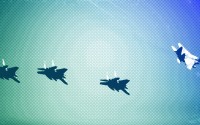When President Bush called Americans to enlist in his "war on terror," very few citizens could have grasped the all-encompassing consequences of the proposition. The terrifying events of 9/11 were like a blinding flash, benumbing the country with a sudden knowledge of unimagined dangers. Strong action was recommended, skeptics were silenced and a shallow sense of unity emerged from the shared vulnerabilities. Nearly three years later, the enormity of Bush's summons to open-ended "war" is more obvious. It overwhelmed the country, in fact deranged society's normal processes and purposes with a brilliantly seductive political message: Terror pre-empts everything else.
What this President effectively accomplished was to restart the cold war, albeit under a new rubric. The justifying facts are different and smaller, but the ideological dynamics are remarkably similar--a total commitment of the nation's energies to confront a vast, unseen and malignant adversary. Fanatical Muslims replaced Soviet Communists and, like the reds, these enemies could be anywhere, including in our midst (they may not even be Muslims, but kindred agents who likewise "hate" us and oppose our values). Like the cold war's, the logic of this new organizing framework can be awesomely compelling to the popular imagination because it runs on fear--the public's expanding fear of potential dangers. The political commodity of fear has no practical limits. The government has the ability to manufacture more.
Nor is there any obvious ceiling on what the nation must devote--in JFK's famous phrase--"to pay any price, bear any burden" in defense of liberty and homeland. Long after the Soviet Union was recognized as a failed economic system, US intelligence agencies continued to warn that it was surpassing America's arsenal of defense and so new, much larger weapons must be built. The year before the Berlin wall fell, CIA analysts reported that Communist East Germany's economy was larger than West Germany's. People believed them. In much the same way, the worldwide network of supposed or potential allies of Osama bin Laden has been steadily expanded by government alerts since 9/11. These fanatical terrorists are not just in the Middle East; the same type has been spotted in East Asia and Africa, even South America. National security experts urge counterterror actions, just in case. Who can say the "intelligence" is wrong? How can citizens even weigh the "facts" when government keeps most of them secret?
"War on terror" is useful for the President, but irrational for the nation. Terrorism is not an enemy; it is a method of using violence to gain political objectives. Its tactics are usually employed by weaker, irregular groups against governments that possess organized armies and the modern means for waging war formally and more destructively (both methods of violence may target and destroy the lives of innocents). Terror campaigns are cruel by nature but in some instances are regarded as righteous, when the violence is used to liberate oppressed peoples from colonial rule, as in Vietnam or Ireland, the creation of Israel or even the United States.
Ronald Spiers, a retired diplomat who served as US ambassador to Turkey and Pakistan and as Assistant Secretary of State for Intelligence, explained these distinctions in an incisive essay published in Vermont's Rutland Herald. "How do you win a 'war' against a tool that, like war itself, is a method of carrying on politics by other means?" Spiers asked. "A 'war on terrorism' is a war without an end in sight, without an exit strategy, with enemies specified not by their aims but by their tactics. Relying principally on military means is like trying to eliminate a cloud of mosquitoes with a machine gun.... It brings to mind Big Brother's...war in Orwell's 1984. A war on terrorism is a permanent engagement against an always-available tool."
My advice for Americans is also an urgent warning: Get a grip, before it is too late. Take a hard look at your own fears, reconsider the probabilities of danger in the larger context of life's many risks and obstacles. The trauma of 9/11 stimulated infinite possibilities for worry--some quite plausible, but most inspired by remote what-if fantasies. A society bingeing on fear makes itself vulnerable to far more profound forms of destruction than terror attacks. The "terrorism war," like a nostalgic echo of the cold war, is using these popular fears to advance a different agenda--the re-engineering of American life through permanent mobilization. The transformation is well under way. The consequences, if left unchallenged, will be very difficult to reverse. Let us count them:
§ As a first consequence, politics collapsed. That is, the usual contentiousness of opposing viewpoints and disputed facts virtually evaporated before the sweeping logic of Bush's mobilization. With a few brave exceptions, Democrats embraced the premises of Bush's pronouncement, supported his plans for hot war and elaborated their own ideas for defending the homeland. Major media played an important role in the political passivity, as they whipped up the fear factor and fell into line behind Bush's "war." Critics asking questions were ignored or scolded for their timidity. Labor unions were told that the long-established rights of workers were not compatible with waging war on unknown terrorists.
Now that the war in Iraq has gone so badly and public doubts are growing rapidly, many more Democrats and even some Republicans are willing to attack the President's management, but still do not challenge the breadth and nature of his "war" commitment. Indeed, with ill-concealed relish, the Democratic Party "is attacking Bush from the right" on domestic security, as a Senate Democratic aide put it, waving the bloody shirt of 9/11 and accusing Republicans of failing to protect citizens on the endangered home front.
§ US foreign policy has been stood on its head. Every complexity and volatile force in global affairs has been redefined as subsidiary to terrorism and, in most cases, pushed aside. After decades of organizing and leading global alliances, the aggrieved superpower claims a new right for itself--to wage pre-emptive war (unilaterally if necessary and justified by its own facts) against any nation-state that supports terrorists or appears to tolerate their presence. The United States subsequently added another legitimizing cause for war: the defeat of brutal dictators so that democracy may be planted on alien soil. This claim is based on the tenuous belief that democracies do not sponsor terrorist acts against innocent civilians. (For contrary evidence, see the history of CIA covert actions in the cold war.)
Between these two rationales, the world provides a very long list of potential battlefields and available adversaries, if Bush so chooses to target them. The strategic intent in Iraq, it seemed, was to compel by example: Conquer one rogue nation with overwhelming military force and others will fall into line. This approach assumes that national governments are the principal agents behind terrorist groups. If so, which nations are behind the ongoing chaos in Iraq? Must we invade them, too?
John Kerry, while he criticizes the unfolding chaos in Iraq, is not prepared to call the war a mistake or to abandon Bush's initial premise that pre-emptive invasion and wall-to-wall defenses are justified in these new circumstances of terrorist attacks. In total war, skepticism is weakness, silence is patriotic, admission of error is dishonorable. Throughout the cold war, this corrupted logic intimidated conventional politicians with fiendish effectiveness.
§ For the armed services and the arms industry, terror blew the lid off the Pentagon budget. Before September 2001 Defense Secretary Donald Rumsfeld was confronted with a severe budget crunch--the military-industrial complex's inflated appetite far surpassed the available money. Rumsfeld was losing the struggle, his "military reform" proposals brushed aside by the Joint Chiefs and Congress. After 9/11 the military forces could have whatever they needed and much more. What politician would say no? More than $300 billion in new spending has been added to the Pentagon budget in less than three years--most of it to fight two wars, but scores of billions were also devoted to beefing up security at military installations and for launching such long-sought (but terror-irrelevant) projects as the $53 billion missile defense system. This high-tech antimissile shield will allegedly protect the continental United States from North Korean missiles, but it still has not passed conclusive reliability tests. We'll probably never find out whether or not it works, but, like so many cold war concoctions, it may make people feel safer and stronger.
The $300 billion is only a beginning. Once Iraq is resolved, the Pentagon will need more money to replenish munitions and replace destroyed vehicles, but also to restore troop strength, as reservists and regulars opt out in droves. Iraq will surely leave behind a public distaste for pre-emptive war, but given the vast and unknowable "threat," it would be irresponsible for military leaders not to prepare for the next war and the next one after that. Meanwhile, a new generation of expensive weapons systems, inherited from cold war planning, is approaching the production stage, and costs are soaring. In other words, the Pentagon's budget crunch is returning with a vengeance. Based on already known commitments, the "war on terror" will add another $885 billion to federal deficits in the next ten years, according to the Center for Strategic and Budgetary Assessments (more than enough to finance a system of universal healthcare). Congressmen suggesting that a revival of the draft may be needed are not hallucinating.
§ The domestic context of American society may eventually undergo the most drastic (and insidious) changes, if the current logic advances unchallenged. The quest for homeland security is heading, in ad hoc fashion, toward the quasi militarization of everyday life. So far more than $120 billion in new spending has been devoted to constructing domestic protections, but each new project merely demonstrates how incomplete the homeland security system is--and how impossible an airtight defense would be for an open and free society. Yet nobody in Congress wants constituents left unprotected. So government is pushed to formulate larger and more grandiose plans--exotic technological schemes for surveillance and ready-response to ward off more of the infinite possibilities, just in case. Addressing fear begets more fear. If danger might lurk anywhere, maybe everything must be protected and policed [see sidebar on page 16].
The security systems involve computers, cameras, remote sensors, electronic alarms and bomb-sniffing dogs, but also require old-fashioned political monitors--government agents watching people for hints of dangerous intentions. Washington is assembling a "unified watch list" of potential troublemakers--their identities contributed by every federal agency, names that will be shared with local and state law enforcement. Any motorist stopped by a patrol officer can be electronically checked out with the FBI's Terrorist Screening Center and held for questioning if the Feds desire. The initial list, Congress is informally advised, will contain the names of 120,000 citizens who, for one reason or another, might be regarded as a "threat." An "agro-terrorist" identified by the Agriculture Department could be someone who likes to set fires in national forests or maybe a political activist trying to save trees. Neither type is known to associate with Osama bin Laden.
"When does a watch list become a blacklist? That's the problem," ACLU legislative counsel Timothy Edgar explained. The "lists" are proliferating, and once your name is on one, it's extremely difficult to get off. The government has a "no-fly list," used by airlines to bar passengers from boarding planes (a source of many Kafkaesque episodes of mistaken identity). The government also has a "shippers' list" to block "suspects" from getting jobs at port terminals and aboard cargo ships. A new "Computer Assisted Passenger Profiling System" is collecting more names by "mining data" from the voluminous personal records of consumers/employees/citizens. The FBI's long, sordid history of spying on and intimidating citizens--civil rights leaders, antiwar activists, political dissidents of the left and right--illustrates the possibilities.
§ Finally, the national economy is significantly altered too, because terrorism is industrial opportunity. Designing the software for new surveillance systems, building antiterror gadgets for homes and offices, developing new drugs to combat obscure biological attacks, hiring more guards and guard dogs--all can now be regarded as defense production. Boeing got a $1 billion no-bid contract to help airports and airlines organize their defenses. Marmion Air Services is selling explosion-proof air conditioning and refrigerators ("It truly is a very exciting time in the company's history," said CEO Wilbert Marmion). Taser International's stock soared last year from $4.04 to $82.96. The Taser stun-gun can incapacitate any terrorist who gets closer than twenty-one feet.
The government has invited private enterprise to come up with the technological fixes for terror--a familiar American response to complex problems--and untold billions are on the table as incentive. The bureaucratic chaos and lack of priorities at the Department of Homeland Security has frustrated many business contractors, but a crudely improvised "industrial policy" is emerging. The "terrorism war" directs major economic stimuli to key sectors--arms manufacturing, information technology, pharmaceuticals, biotech research and, of course, security hardware. Government has indemnified manufacturers of antiterror devices against consumer lawsuits, just in case the gadgets fail to work. Many other interests are clamoring for a piece of the action. The development capital provided by taxpayers to these "war" industries can be thought of as "terror pork."
Altogether, the momentous alterations in government and society derive from Bush's unilateral announcement of an uncharted war. One should not assume the President himself fully grasped all of the many consequences in advance, any more than his team understood what they were getting into in Iraq. But no matter. "War on terror" is a political slogan--not a coherent strategy for national defense--and it succeeds brilliantly only as politics. For everything else, it is quite illogical.
An important question remains for Americans to ponder: Why have most people submitted so willingly to a new political order organized around fear? Other nations have confronted terrorism of a more sustained nature without coming thoroughly unhinged. I remember living in London briefly in the 1970s, when IRA bombings were a frequent occurrence. Daily life continued with stiff-upper-lip reserve (police searched ladies' handbags at restaurants, but did not pat down the gentlemen). We can only speculate on answers. Was it the uniquely horrific quality of the 9/11 attacks? Or the fact that, unlike Europe, the continental United States has never been bombed? For modern Americans, war's destruction is a foreign experience, though the United States has participated in many conflicts on foreign soil. Despite the patriotic breast-beating, are we closet wimps? America's exaggerated expressions of fear may look to others like a surprising revelation of weakness.
My own suspicion is that many Americans have enjoyed Bush's "terror war" more than they wish to admit. Feeling scared can be oddly pleasurable, like participating in a real-life action thriller, when one is allied in imagined combat with a united country of brave patriots. The plot line is simple--good guys against satanic forces--and pushes aside doubts and ambiguities, like why exactly these people are out to get us. Does our own behavior in the world have anything to do with it? No, they resent us because we are so virtuous--kind, free, wealthy, democratic. The contest, as framed by Bush, invites Americans to indulge in a luxurious sense of self-pity--poor, powerful America, so innocent and yet so misunderstood. America's exaggerated fear of unknown "others" is perhaps an unconscious inversion of its exaggerated claims of power.
The only way out of this fog of pretension is painful self-examination by Americans--cutting our fears down to more plausible terms and facing the complicated realities of our role in the world. The spirited opposition that arose to Bush's war in Iraq is a good starting place, because citizens raised real questions that were brushed aside. I don't think most Americans are interested in imperial rule, but they were grossly misled by patriotic rhetoric. Now is the time for sober, serious teach-ins that lay out the real history of US power in the world, and that also explain the positive and progressive future that is possible. Once citizens have constructed a clear-eyed, dissenting version of our situation, perhaps politicians can also be liberated from exaggerated fear. The self-imposed destruction that has flowed from Bush's logic cannot be stopped until a new cast of leaders steps forward to guide the country. This transformation begins by changing Presidents.
http://www.thenation.com/docprint.mhtml?i=20040621&s=greider






